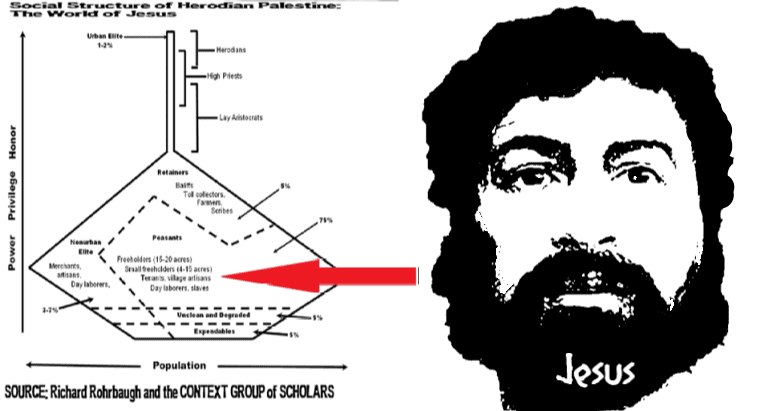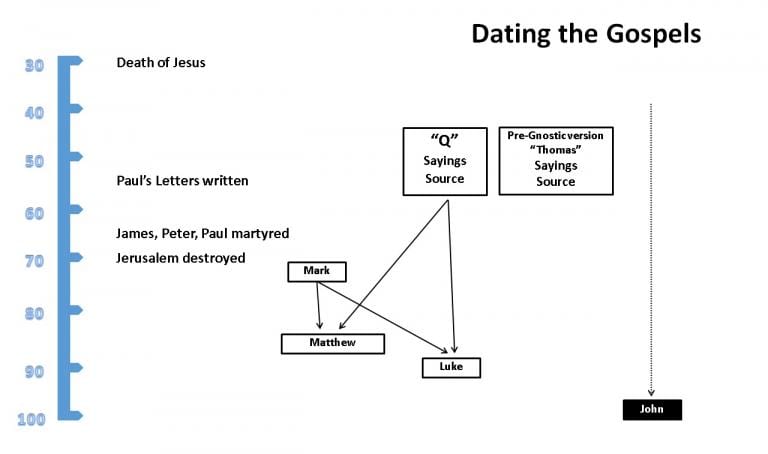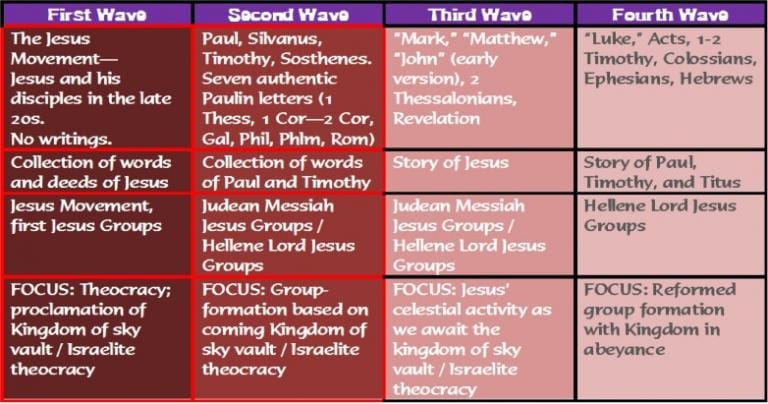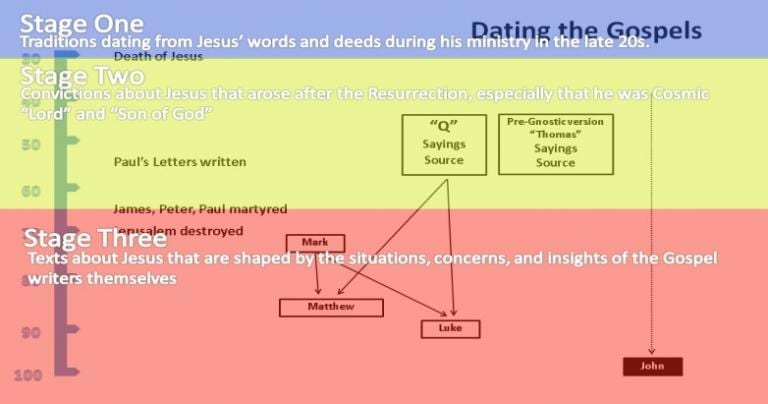
Changing deeds and words of Jesus is not something recent in Christian history—from New Testament times this has always occurred.
“Changing things! They want to change everything,” the Trad screamed. “Those liberal heretics are always changing things!”
I don’t know about you, but I have a number of brothers and sisters, like the one above, incensed with the idea of change. Hated change is all around them. The world we live in knows rapid change. In fact, it has always known change.
To be fair, I don’t think we should treat people like my Trad friend as an anomaly. None of us are too comfortable changing. But change we must. So, here is a little post about changing things. It concerns yesterday’s Gospel, Mark 2:1-12. It is the story of Jesus healing the paralytic who was lowered through a roof. The story has parallels in the other Synoptic Gospels, Matthew 9:1-8 and Luke 5:18-22.
Look at this same story in the three different Gospel accounts carefully. Maybe take a pad with a pen and list the differences between each. Do that, and you will see that Gospel stories about Jesus’ deeds vary greatly. There was changing going on at all levels of its handing on. Same thing about his sayings as they are reported—changing of things can be seen at all levels. See that, and you should be wondering: what did the historical Jesus actually do and say?
Changing the Beatitudes
Have a gander at these parallel sayings all attributed to Jesus by Gospels—
Luke 6:20—
Blessed are you poor, for yours is the kingdom of God.
Matthew 5:3—
Blessed are the poor in spirit, for theirs is the kingdom of sky vault.
Gospel of Thomas, Logion 54—
Blessed are the poor, for yours is the kingdom of sky vault.
Biblical scholars, such as Richard Rohrbaugh, invite us to ponder verses like these. Did the historical Jesus actually say any of these beatitudes? They seem similar, but each is slightly different. It looks like these are three takes on the same saying of Jesus.
Consider the way “Matthew” puts it. Only he has “the poor in spirit.” Rohrbaugh inquires as to where “Matthew” got that from. Did he invent it? Or was that actually how the historical Jesus put it? “Poor in spirit” is different than the way “Luke” or the pre-Gnostic version of the Sayings-gospel of “Thomas” have it. It’s not the same thing! The meaning is radically different. Things have changed.
Also see how in “Luke” it reads “yours” but in “Matthew” we get “theirs”? That tells us that “Matthew” or whoever actually wrote the document we call “Matthew” was not, himself, poor. He is writing about people who are distant from him on the socio-economic scale.
The ancient Sayings-gospel of “Thomas” is similar to “Luke”—“yours,” not “theirs.” This indicates to scholars like Rohrbaugh that the Lucan version of this saying of Jesus, at least in this regard, is closer to the original words of Jesus than is the Matthean version. Hence, for some reason, “Matthew” has probably augmented it. Between whatever Jesus actually said something (ca 29 CE?) and “Matthew” put his version down (ca 80s CE), this saying has been tweaked. Changing things is an old tradition.

Changing the Kingdom
We can see clearly that “Luke” also did some tweaking and changing of Jesus-sayings. See the expression “kingdom of God” in the Lucan text? Both “Matthew” and the Sayings-gospel called “Thomas” use a different expression, “kingdom of sky vault,” what Rohrbaugh explains was the politically correct expression for Israelite theocracy. First century barbarian Israelites like Jesus reverenced God to the point of even refraining from saying the word “God.” Hence scholars believe that the Matthean version, in this regard, is closer to the original saying than is the Lucan version.
Changing the Hungry
Luke 6:20—
Blessed are you that hunger now, for you shall be satisfied.
Matthew 5:3—
Blessed are those who hunger and thirst for righteousness, for they shall be satisfied.
Gospel of Thomas, Logion 54—
Blessed are the hungry, for the belly of him who desires will be filled.
Question—who exactly will be satisfied in both “Luke” and “Matthew”? Considering these parallels together with the last Jesus saying, Rohrbaugh invites us to see a pattern. Note again that for “Matthew” those hungry (for literal food or justice)—poor people—are “they” rather than “you.” Again we see that “Matthew” is not of the poor and is distant from them. Changing in his version happened accordingly.
Surely the most talented scribe of the New Testament we call “Luke” was an elite in social status, but scholars like Rohrbaugh say that he was nevertheless closer to the poor than “Matthew.” Also noticing “Thomas”—which seems to echo the starving situation of a Galilean peasant day laborer—could “Luke” perhaps closer to Jesus’ original saying?
Changing the Generation
Mark 8:12—
“Why does this generation seek a sign? Amen, I say to you, no sign will be given to this generation.”
Luke 11:29—
“This generation is an evil generation; it seeks a sign, but no sign will be given it, except the sign of Jonah.”
Matthew 12:39-40—
“An evil and adulterous generation seeks a sign, but no sign will be given it except the sign of Jonah the prophet. Just as Jonah was in the belly of the whale three days and three nights, so will the Son of Man be in the heart of the earth three days and three nights.”
Although obfuscated by popular Catholic literature, non-scholarly EWTN, many so-called apologists, and a plethora of Religious Education programs, the overwhelming majority of Biblical scholars agree that the first written Gospel had to be “Mark.” There is overwhelming scholarly consensus that when they wrote their Gospels, both “Matthew” and “Luke” had a handy copy of “Mark” from which to copy and follow narratively. Rohrbaugh explains that should we see in this common material any alterations or changes, such change had to be deliberate.


Rohrbaugh and others invite us to take notice of how “Luke” augments the Markan material here in this Jesus saying about a sign. Luke spices it up with, “this generation is an evil generation.” Rohrbaugh says “Luke” has inserted a little editorial comment into the Markan original, something like, “You so-and-sos! You evil SOBs!” See?
Changing the Sign
The Markan Jesus says that no sign will be given to this generation. The Lukan Jesus agrees with the Markan Jesus. However “Luke” plops in “except the sign of Jonah.” Rohrbaugh explains that the expression “except the sign of Jonah” might sound cryptic to many. What does that mean?
And “Matthew” also has that extra bit about “except the sign of Jonah,” which informs scholars that someone, another source common to both “Matthew” and “Luke” besides “Mark” had made this modification. But look at how “Matthew” adds an explanatory insertion about Jonah the prophet and his experience in the great fish. Rohrbaugh explains that for the Jesus group of “Matthew,” explanation was required that apparently was not needed for the audience of “Luke.”
The Matthean Jesus agrees with Lukan Jesus, saying that the generation is evil. But Matthean Jesus adds that it is also “adulterous.” Rohrbaugh explains that as we go further away from Jesus’ Galilean setting, “this generation” increases in evil.

Hopefully you should be beginning to see something about the evolution of our Gospels. It should be clear how the early Jesus groups used Jesus-sayings. They freely modified them with editorial additions and augmentations. These authors routinely added explanatory comments. They arranged and rearranged traditions about Jesus according to the needs of their communities these authors perceived. Therefore Rohrbaugh says, the sayings of Jesus throughout the first century “mutated” and “grew.”
Changing Gospel Stories
Mark 2:3-4—
And they came, bringing to him a paralytic carried by four men. And when they could not get near him because of the crowd, they removed the roof above him; and when they had made an opening, they let down the pallet on which the paralytic lay.
Matthew 9:2—
And behold, they brought to him a paralytic, lying on his bed; and when Jesus saw their faith he said to the paralytic, “Take heart, my son; your sins are forgiven.”
Luke 5:18-19—
And behold, men were bringing on a bed a man who was paralyzed, and they sought to bring him in and lay him before Jesus; but finding no way to bring him in, because of the crowd, they went up on the roof and let him down with his bed through the tiles into the midst before Jesus.
Beds and Roofs
Here we find the Gospel from yesterday together with its Synoptic parallels. In the original from “Mark” four men bring a paralytic to Jesus. Notice that the men remove the roof of the house where Jesus is so to lower the paralytic down.
Richard Rohrbaugh, who has done extensive field research in the Middle East, says that the detail “Mark” includes about how “they removed the roof” that makes perfect sense for Jesus’ Palestinian context. Rohrbaugh explains that Galileans built their roofs by placing branches over scaffolding and laying mud on top—digging through that would not be too difficult and seems to be what “Mark” suggests.
Notice that the paralytic is lowered down on his pallet. Rohrbaugh explains this is a mat that poor Middle Eastern people sleep on at night. It gets rolled up during the daytime, and placed in the corner of the room.
Mat or Bed?
But when the story gets to “Matthew” some changes happen. “Matthew” claims that the paralytic was brought to Jesus “lying on his bed.” Rohrbaugh explains that, yet again, we have another indication that “Matthew” is not writing to poor people. He is far removed from the starving Galilean village setting of Jesus and his immediate followers. “Matthew” could not have been poor himself. He is writing to an audience that sleeps in beds. For a Jesus-tradition to go from poor, starving, illiterate Galilean villages to “Matthew” an uncrossable social chasm has been crossed!
Rohrbaugh is emphatic that Galilean peasants did not own beds. But when you move the story into a new context, the vocabulary starts to change. As Rohrbaugh is fond of saying, “language only means what it means where and when you use it!”
What Sort of Roof?
It is pretty clear that like “Matthew,” “Luke” also comes from a world of beds. But look at how “Luke” says, “they went up on the roof and let him down with his bed through the tiles…” Rohrbaugh explains that there were no tiled roofs in first century Galilee.
When “Luke” describes this detail about tiled roofs that gives us a clue as to his whereabouts. Rohrbaugh says that tiled roofs belong in a Greco-Roman city—maybe Corinth, possibly Athens, or some other similar location. This would be where “Luke” originates. The tiled roofs of such a polis would be familiar to “Luke.” Hence he writes of them. Because the only roofs he knew were tiled, Rohrbaugh says “Luke” was oblivious to digging through a muddy-thatch roof. Therefore, he didn’t get his source, “Mark.” Keep in mind that when you retell a story in a new setting, vocabulary and even the meaning of words begins to change.
Changing and Respect
Traditions about what Jesus said and did varied widely even within mere decades of the first century. As stories percolated around the Mediterranean, seasoned by the crises faced in geographically separated Jesus groups, these changed. Imagine what these stories become in our 21st century American hands! If we aren’t very careful, we will inescapably dump into them loads of Western understandings foreign to Jesus and his Galilean peasant audience.
More later…












